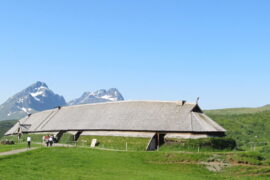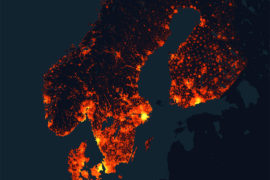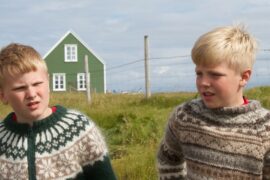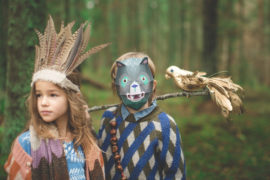Norwegian last names have a fascinating history. They can tell a story about a person’s ancestors, where they came from or even give clues to their occupation.
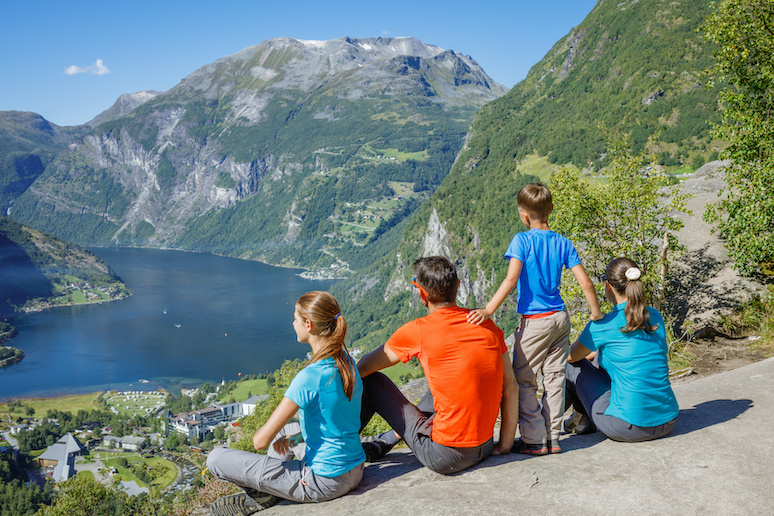
If you need a simple guide to understanding Norwegian last names, then look no further.
We’ll take a look at the types of last names found in Norway, as well as some beautiful Norwegian last names – and we’ll check out their origins.
The most common Norwegian surnames
Here’s a list of the most common surnames found in Norway, with the number of people holding that surname.
| 1 | Hansen | 62,211 |
| 2 | Johansen | 57,100 |
| 3 | Olsen | 56,926 |
| 4 | Larsen | 43,421 |
| 5 | Andersen | 42,678 |
| 6 | Nilsen | 39,789 |
| 7 | Pedersen | 39,608 |
| 8 | Jensen | 26,645 |
| 9 | Kristiansen | 26,556 |
| 10 | Karlsen | 24,041 |
How do Norwegian last names work?
So why do all of the last names in the list above end in -sen? Is there a Norwegian naming system? And if so, what is the meaning of it?
Well, this is down to the prevailing patronymic naming system.
In Norway, as in most cultures, a person’s last name is passed down from their father to their children, with some exceptions.

Until the 1860s, families in Norway did not have fixed surnames. Instead, they followed a system known as patronymics. This means that a person’s last name is based on the first name of their father.
The last name is typically formed by adding –sen (for male) or –datter (for female) to the end of the father’s first name.
For example, if a man named Olaf has a son named Lars, Lars’s full name would be Lars Olafsen, which means “the son of Olaf”.
Similarly, if Olaf’s daughter is named Ingrid, her name would be Ingrid Olafsdatter, which means “the daughter of Olaf”.
This tradition was widely used throughout the Scandinavian countries but began to fall out of use in Sweden during the nineteenth century when most people adopted fixed names.
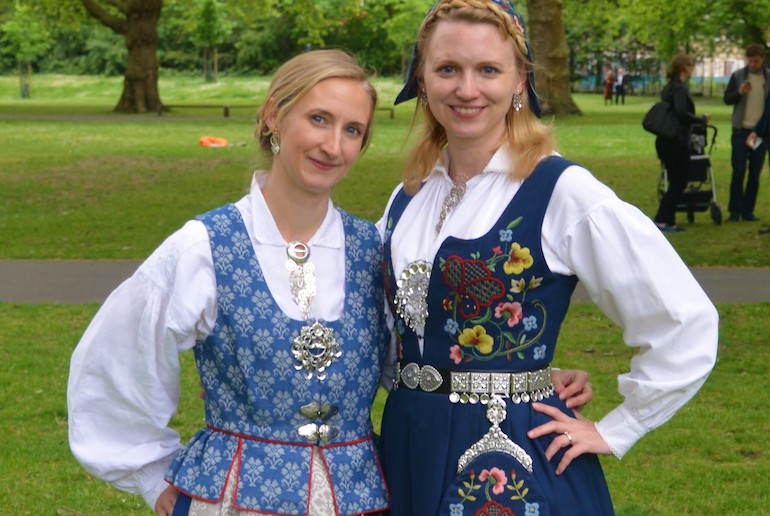
This is why we no longer see the suffix -datter used in Sweden any more.
Only Iceland retained this patronymic system widely – for more on this, see our guide to Icelandic last names.
How to find out where a Norwegian name comes from
If a surname derives from the patronymic system, that tells you who the father was.
However, there are other types of last names found in Norway, some of which can tell you where the family came from, or what the person’s job was.
The farm name
One example is the farm name, also known as gårdnavn. These names are based on a person’s connection to a specific farm or piece of land.
Here are a few common farmstead names along with their meanings:
- Hove = place of worship
- Sund = strait
- Odden = headland
- Rosdahl = clearing in a valley
- Fure = pine or fir tree
- Greseth = farmstead made from stone
- Selland = land where willows grow
- Groven = hollow
Although these names have their own meanings, they were typically given to someone who lived in or near a farmstead of that name.
Toponymic names
Also referred to as geographic names, a toponymic name derives from a place or geographic feature.
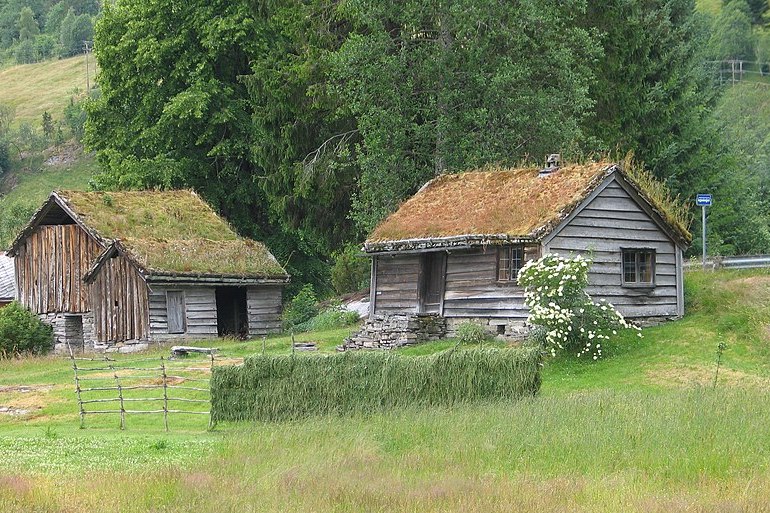
In Norway, toponymic names give a great insight into finding out where a Norwegian name comes from, as many Norwegians are named after the place their family came from.
A few examples of Norwegian toponymic names include:
- Aaberg = on the hill by the river
- Lund = grove
- Nordd = one from the North
- Holm = small island
- Hagen = pasture
- Gaarder = farm
- Granberg = a mountain where spruce grow
- Gronlund = green grove
Occupational last names in Norway
A surname based on one’s occupation or profession is another theme among Scandinavian last names. Common occupational names in Norway include:
- Fiske = fisherman
- Horn = carving or playing a horn
- Moller = miller
- Smed = smith
Norwegian last names and their meanings
Let’s run through a few of the most popular last names in Norway and discover the meaning behind them.
Hansen
One of the most common Norwegian last names is Hansen. This name is derived from the Hebrew name Johannes, which means “God is gracious.”
The name became popular in Norway during the Middle Ages, and it is estimated that about ten percent of all Norwegians have the last name Hansen or a variation of it.
Johansen
Like Hansen, this name is derived from the Hebrew name Johannes. In fact, the name Hans is short for Johansen. Johan is also an alternative version of the name John.
Larsen
Another common Norwegian last name is Larsen. This name is derived from the Latin name Laurentius, which means “from Laurentum.” Laurentum was a city in ancient Italy, and the name became popular in Norway during the Middle Ages.
Berg
The last name Berg simply means “mountain”. This is a toponymic name and can be used as a suffix or on its own.
Dahl
Dahl is a common farm name derived from the Old Norse word dalr, which means valley. This name would have been given to someone who lived in or near a valley.
Rare Norwegian last names
Sure, it’s good to know the most common names found within a country. But what about some of the lesser-known names?
In Norway, there are many last names you could consider unique and rare. Here are a few rare names along with the number of people who carry it.
| Husebø | 827 |
| Vikan | 827 |
| Borg | 826 |
| Holme | 826 |
| Storli | 826 |
| Beck | 823 |
| Høiland | 823 |
| Strømsnes | 822 |
| Bentzen | 821 |
| Albertsen | 817 |
Cool Norwegian last names
So now that we know the most common and the least common surnames, let’s look at some really cool Norwegian last names and the meanings behind them.
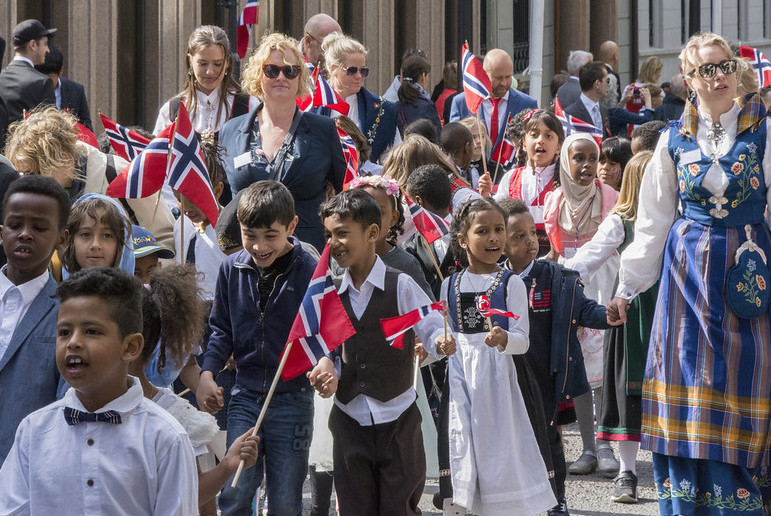
We’ll look at some Viking last names from Norway and those deriving from Old Norse.
Old Norse last names
- Jordahl = Old Norse meaning “the shining river”
- Aamodt = Old Norse for “river meeting” and refers to someone who lives where two rivers meet.
- Ulberg = Old Norse meaning “wolf mountain”
- Elden = Old Norse word meaning “fire”
- Hove = Old Norse meaning “place of worship”
- Wang = Old High German word for “meadow” or “grassy hill”
- Rike = Old Norse word for “ruler” or “power”
Viking last names
- Borg = fortification
- Haraldson = son of Harald / son of the commander
- Havard = protector or high guardian
- Bakke = hillside or slope
- Falk = falcon
- Thorvald = Thor’s ruler
- Ragnulf = wolf advisor or warrior
Norwegian last names in the US
Many Norwegians immigrated to the United States in the nineteenth and early twentieth centuries, and their descendants still carry Norwegian last names. Names like Johnson, Hansen, Anderson, Larsen and Thompson all have their origins in Norway.
It’s worth noting that, like many immigrants, some Norwegians tried to adopt the naming customs of the country they settled in. This is why several of the names may have a slight adjustment to the spelling, in order to Americanize the name.

There are a few notable celebrities with Norwegian-sounding last names. Maybe you will recognize a few!
- Roald Dahl – British novelist of Norwegian descent
- Joni Mitchell (born Roberta Joan Anderson) – American/Canadian singer and songwriter
- Elizabeth, Marie-Kate and Ashley Olsen – American actresses
- Dakota Johnson – American actress
- Kristen Wiig – American actress
- Lance Henriksen – American actor
See also:
A simple guide to Icelandic last names
Cool Viking names and their meanings
Norse names and their meanings


